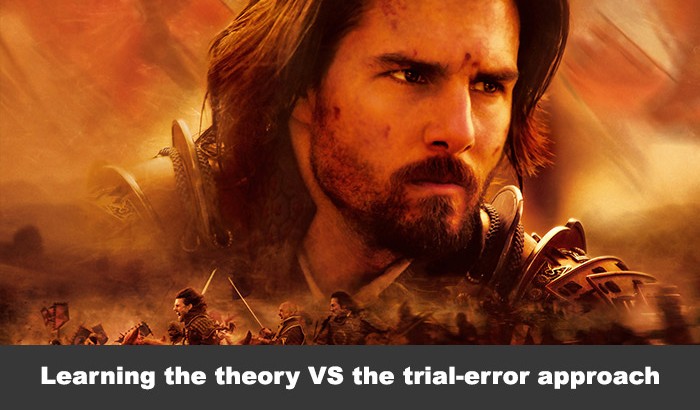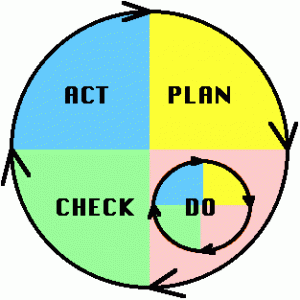There are 2 ways of learning:
- learning by reading the theory and applying it
- learning by doing and trial-error
Both methods have advantages and disadvantages that you must understand.
Learning by reading the Theory – The Top-down approach
This is the method most preferred by school and the educational system in general.
Start with a book, learn the theory, from the theory, you understand how to solve few practical exercise and then you just have to apply it.
There is just a small problem… did you ever encountered problems exactly similar to the problems described by the theory?
I bet not… real problems are much more complex to solve and sometimes you cannot even draw the link between the real problem and the problem in your book.
That’s normal. Theory is theory.
There are assumptions… which prove to be wrong most of the time.
And that’s why we have been prone to simplify problems…and then create theory.
Real life is real life and theory is theory.
Understand the theory doesn’t imply you understand the real life.
But understanding the real life will prove useful to solve real life problems 🙂
That’s where you must go into practice and go for the 2nd method: learning by trial and error
Advantages of learning by Theory (by yourself):
- You just need to go to the library, take a book and be willing to commit your time
- No one is criticizing you
- More suitable for analytical persons
Disadvantages of learning by Theory:
- Somewhat disconnected with the reality. If you spend too much time on it, you become convinced that everything works like in a book and you may delude yourself that you know everything while you really don’t
- Poor connection with real life problem
Learning by doing and trial and error
Did you ever wondered how babies are learning to speak or to walk?
They are not learning by reading a book of grammar or attending a course “7 steps to be a successful walker”
They are just trying, then falling, then trying, then falling,… you got it
Then if we all learn by trial error, why are we taught in school that the best way to learn another language is first to learn the grammar and the vocabulary??
(Hint: Because that’s the way the education system is built…)
The problem is that the older we become, the more we forget about this simple truth:
To succeed you have first to fail a lot and then to take the learning from your failure to optimize the results and go forward.
Like you learned to speak and like you learnt to walk.
Why do we forget? Why don’t we apply this method to everything?
The fear of failure prevent us from trying (read this post)
When we grow older, we become more and more afraid to fail because:
- We don’t have much time
- Failure has consequences
- We don’t want to be criticized
- …
In my opinion though, there’s nothing like trying and failing and then trying again.
I like this sequence from the movie: “The last samurai”. It shows the power of the person who is not afraid to take hits to learn. That’s the power you should master in doing anything.
Advantages to learn by trial errors:
- You know what awaits you in real life and you know how to face it
- You learn practical skills
- Learning is like a game, not just an exercise of patience in the library.
Disadvantages:
- Difficult to learn like that skills that don’t have an immediate feedback because the improvement loop takes a lot of time
- You have to surmount the fear of failure and the fear to be criticized by others
The Ultimate Power: Combine Theory and Practice
Now if you really want to be strong in something, the “trick” is to ally Theory and practice.
(That sound like a cliche… but that’s true)
Knowing theory will help you to construct a basic plan.
Knowing the practice will help you to apply the plan and to learn from your failure and improve the plan.
At this stage, the practice gives you an useful feedback on your initial plan than can be changed dynamically to integrate the response to obstacle that you encounter.
In fact, you can even expect that your plan will fail… and that’s why you have constantly to correct it.
Why am I writing that here?
Because this wisdom can be applied basically everywhere!
Using this strategies, you can learn engineering, sales, marketing, language, any sport,… imagine the power to combine theory and practice! It’s unlimited.



